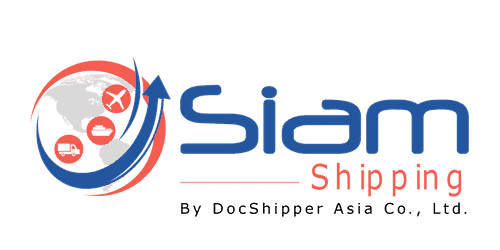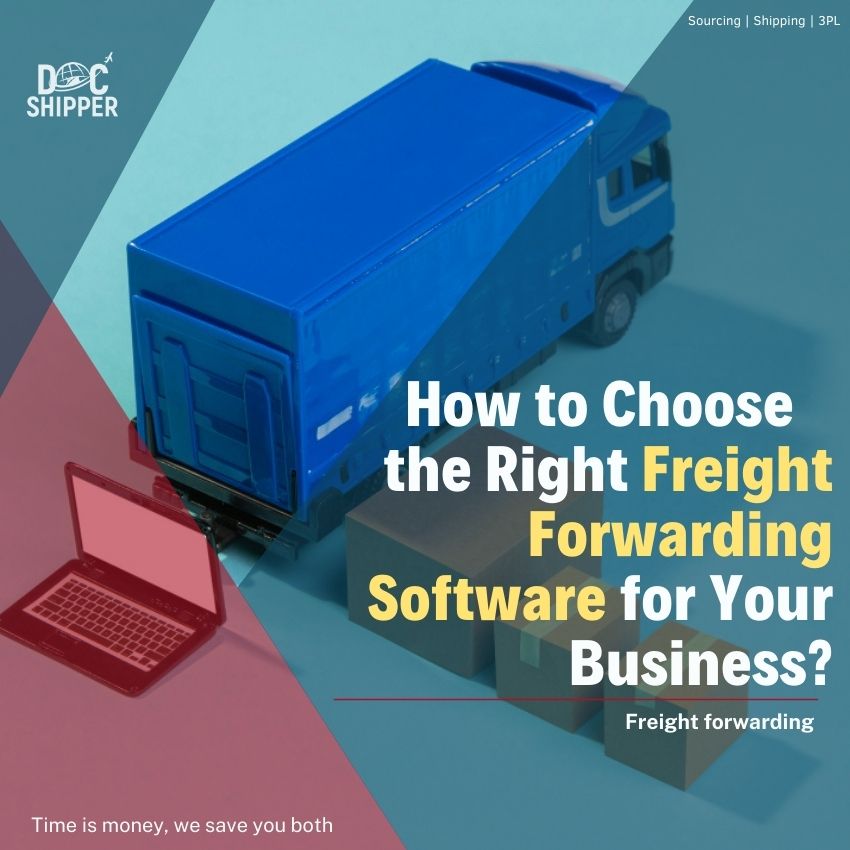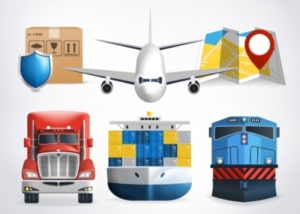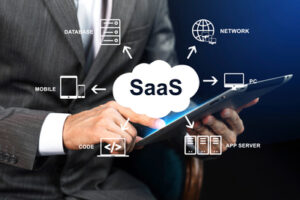Freight forwarders are an essential part of the global supply chain, responsible for the movement of goods across borders and between countries. They play a critical role in ensuring that products are delivered to their intended destinations in a timely and cost-effective manner. However, managing these operations without the use of freight software can be a daunting task.
Running a freight forwarding business is easier than ever if you have shipping software that implements the latest technology according to your needs and saves you some manual operations and a ton of extra effort.
Here are some essential questions you will be able to answer in this article: "How do we know it's worth investing in this software?", "Can we use outdated software, or will it not be very profitable from streamlining our company's operations", and "Does having digital freight forwarding software save money in many different ways”?
Table of Contents
What challenges do freight forwarders face when managing their operations without freight software?
In the following paragraphs, we will explore some of the challenges that freight forwarders face while managing their operations without using freight software.
Lack of real-time visibility:
One of the most significant challenges of managing operations without freight software is the lack of real-time visibility. Freight forwarders must always know the exact location and status of their shipments. Without freight software, this information can be challenging to obtain, and it may be not easy to keep track of multiple shipments across different modes of transportation.
Manual data entry
Freight forwarding operations can involve a lot of paperwork, from bills of lading to customs declarations. Without freight software, this data entry can be time-consuming and error-prone. Manual data entry also increases the risk of lost or misplaced paperwork, leading to delays and potential financial losses. As the freight shipping trend moves toward greater automation and digitalization, relying on outdated manual processes puts companies at a competitive disadvantage.
Limited analytics and reporting
Freight forwarders need access to analytics and reporting tools to track their performance, identify trends, and make data-driven decisions. However, without freight software, these tools may be limited, making it difficult for forwarders to analyze their operations effectively and make improvements.
Lack of automation
Freight forwarding operations can be complex, involving multiple stakeholders and various tasks. Without freight software, many of these tasks must be done manually, which can be time-consuming and labor-intensive. This lack of automation can also increase the risk of errors and delays, leading to potential financial losses.
Difficulty in managing communication
Communication is critical in the freight forwarding industry, with stakeholders in different locations and time zones. Without freight software, it can be challenging to manage communication effectively, leading to misunderstandings, delays, and potential financial losses.
Freight forwarders face several challenges when managing their operations without the use of freight software. Real-time visibility, manual data entry, limited analytics, and reporting, lack of automation, and difficulty in managing communication are just a few of the issues that can arise. Investing in freight software can help forwarders overcome these challenges, streamlining their operations, reducing costs, and improving efficiency.
SIAM Shipping info : Siam Shipping uses the latest technologies and software in order to provide our clients with the best shipping services. Find out more about our shipping services, or feel free to contact us for further information.
How does a freight forwarding system contribute to an efficient work process?
Freight forwarding work is a set of many activities that are performed sequentially in the course of each process. Challenges and obstacles are a daily routine that we can reduce if we have a reliable software program tailored to our business.
Simple and smooth execution of each task is a major goal for all shippers, and the software can give you the information you need for each shipment in real time. Everything is recorded and systematized in one place, which allows the extraction of correct analysis and reports.
SaaS is a powerful technology 
Software as a Service (SaaS) is a cloud-based software delivery model that has become increasingly popular over the past decade. It involves the provision of software applications through the Internet, which can be accessed by customers on a pay-per-use or subscription basis. The technology behind SaaS is designed to allow customers to access software applications without having to install or maintain them on their local machines.
SaaS has several advantages over traditional software delivery models. For one, it eliminates the need for customers to invest in expensive hardware, software licenses, and IT personnel to manage the software. It also allows for greater flexibility in terms of usage, as customers can scale up or down their usage depending on their needs.
The technology behind SaaS is based on a combination of cloud computing, web applications, and service-oriented architecture (SOA). Cloud computing provides the underlying infrastructure and resources for SaaS applications, such as servers, storage, and networking. Web applications are used to deliver the user interface and functionality of the software to customers via the Internet. And SOA is used to ensure that the software is modular, scalable, and easily integrated with other applications and systems.
One of the key features of SaaS technology is its multi-tenancy architecture, which allows multiple customers to share the same instance of the software. This means that the software can be customized for each customer's needs, while still maintaining a single code base and infrastructure. Multi-tenancy also enables SaaS vendors to provide automatic software updates and upgrades to all customers, without requiring any intervention on the customer's part.
So, if you are looking for reliable planning and management of freight forwarding work, look for software. Every well-built system offers a subscription that can be properly adapted to any company, regardless of capacity and volume of work.
By switching to SaaS freight forwarding software, you will immediately feel the ease of work of several specialists, while it will reduce the cost of international transport and increase efficiency in the company as a whole.
SIAM Shipping info: SaaS freight forwarding software makes the workflow easier, reduces the cost of international transport and increases efficiency in the company as a whole. You can contact us to get more information about SaaS and how it works.
What things must you consider when starting the “software research” journey?
Use of Software
It is crucial to consider whether the design of the SaaS freight forwarding software is easy to navigate and does not strain the eyes, as well as whether the management of work processes is easy. The simpler a system is, the easier it is to train employees and work faster. This is especially important in the context of e-commerce shipping, where efficiency and speed are essential to meet customer expectations.
Features
It is important to find out if the features are comprehensive or if you are missing something essential that could significantly automate the workflow. The ability to manage all processes in one system is a great advantage for any software.
Speed of implementation and adaptation to business
Good freight software will be up and running with quick and smooth implementation, and flexibility to changes that will lead to perfect adaptation for companies of different scales.
Support services 
Make sure to choose a software company that connects you to a support team. A good freight software company provides 24/7 support and takes care of its clients, whether they are small or big companies.
Websites that Review Freight Software
In the following lines, we will show you some trustworthy platforms that you can rely on when choosing a freight forwarding system for your business. Here they are:
Capterra
This is where you will find some of the most detailed features. It includes a huge number of verified reviews, which means that it will give you very good guidance when you decide to choose a shipping software. Capterra is a proven source where you can make comparisons of different online freight software to make the best decision.
In addition to the good awareness you will receive, the platform is extremely easy to navigate, and the design is intuitive and simple.
G2
G2 gives a quick comparison of several companies at once. The only difference is that the platform contains far less data than Capterra. This is the only drawback, namely that it is difficult to get an unbiased opinion of a company offering forwarding software.
GetApp
Here you can also easily compare some of the software you have chosen. User feedback is quite comprehensive, so you will get good guidance. The distinguishing feature of GetApp is the internal navigation; each user has the opportunity to easily click on the section he wants to enter and get information on a topic. You will learn everything you are interested in; reviews from users of the software, subscription prices, and features.
Goodfirms
Goodfirms is the latest offering. Unfortunately, it also does not offer numerous reviews, but instead allows you to get to know the various companies in great detail. The descriptions of their systems are quite comprehensive and written in understandable language.
Another advantage of this platform is that each user can filter the demand quite precisely. For example, at an hourly rate. So, here you can make a list of companies that go into your budget, and then compare it with some of the other platforms.
To summarize how to choose a Freight Software
Here are some pointers on how to select the best freight-forwarding software for your company:
1- First: Evaluate your needs
Before you start looking for freight forwarding software, you need to evaluate your business needs. Consider what you need the software to do, and how it will fit into your existing processes. For example, do you need a software solution that can help you manage shipments across multiple modes of transport, or do you need a software solution that can help you manage your inventory and warehouse operations? Understanding your needs will help you narrow down your options and choose a software solution that is right for your business.
2- Look for a software solution that integrates with your existing systems
One of the biggest challenges of implementing new software is ensuring that it integrates with your existing systems. Look for a software solution that is easy to integrate with your existing systems, such as your accounting software, ERP system, or transportation management system (TMS). This will help you avoid costly and time-consuming integration projects, and ensure that your new software works seamlessly with your existing processes.
3- Consider the user experience
Freight forwarding can be a complex and time-consuming process, so it's important to choose a software solution that is easy to use and intuitive. Look for a software solution that has a user-friendly interface, and that provides clear and concise information about shipments, invoices, and other important data. This will help your team work more efficiently, and reduce the risk of errors and delays.
4- Check for scalability
As your business grows, your software needs will evolve. Look for a software solution that can scale with your business, and that can support your changing needs over time. This will help you avoid the need for costly upgrades or replacements down the road, and ensure that your software investment provides long-term value.
5- And finally, consider security and compliance
Freight forwarding involves sensitive data, such as shipping details, customs documentation, and payment information. Look for a software solution that has robust security features, and that is compliant with relevant regulations. This will help you protect your business and your customers' data, and avoid costly fines and penalties for non-compliance.
SIAM Shipping Advice : After doing the initial research, we advise you to select several software companies. Remember to be guided mainly by personal needs such as workload, features, shipment capacity, and customization options. The next step is to identify the leading features in each software, as well as those that stand out. Feel free to contact our experts for more details.
The freight management software for your business requires research and accuracy! It also depends on your specific needs and requirements, so it's important to carefully evaluate your options and choose a solution that aligns with your goals and objectives. Put it to work in your best interest!
Logitude World provides freight forwarders with advanced freight forwarding software to manage all operations on one digital platform and deliver superior freight services.
FAQ | How to Choose the Right Freight Forwarding Software for Your Business?
There is no single best freight software, as the specific needs and requirements of different businesses can vary greatly. However, there are several top freight software solutions that are widely used and highly regarded in the industry, including:
The cost of acquiring a freight software can vary widely depending on a number of factors, such as the specific features and capabilities of the software, the size and complexity of your business, and the pricing model of the software provider. Some freight software providers offer their solutions for a monthly subscription fee, while others may require a one-time purchase or offer a perpetual license. As an example, some popular freight software providers like Freightos, ShipStation, and Descartes typically offer subscription-based pricing models with monthly fees that can range from a few hundred dollars to several thousand dollars per month, depending on the specific package and features you require. Other solutions like SAP Transportation Management or CargoWise may require larger upfront investments, with pricing that can range from tens of thousands to hundreds of thousands of dollars. It's important to carefully evaluate the costs and benefits of different freight software solutions before making a purchase decision and to ensure that the software you choose aligns with your business needs and budget. Some providers may also offer free trials or demos to help you get a sense of the software's features and functionality before committing to a purchase.
Yes, like most software solutions, freight software requires regular updates to maintain optimal performance and functionality. Freight software providers may release updates to address bugs, security vulnerabilities, and other issues, as well as to add new features and capabilities to the software. Regular updates are important to ensure that your freight software is working correctly and efficiently, and to minimize the risk of errors or system failures that could disrupt your business operations. In addition, many updates may be required to maintain compatibility with other software or hardware systems that your business relies on. Depending on the specific software and provider, updates may be released on a regular schedule (such as weekly or monthly), or may be released as needed to address specific issues or concerns. Some providers may also offer automatic updates that are installed in the background without requiring user intervention, while others may require manual installation or configuration. It's important to stay up-to-date with the latest updates and releases for your freight software, and to ensure that you have a plan in place for managing updates and maintaining system performance over time. This may include setting up regular backups, testing new updates before deploying them in a production environment, and working closely with your software provider or IT team to identify and address any issues that arise.
Freight software programs can be secure, but the level of security can vary depending on the specific software solution and provider. As with any software that handles sensitive data, it's important to take steps to ensure that your freight software is secure and protected from unauthorized access, theft, or other security breaches. Many freight software providers implement a range of security measures to protect their software and user data, such as encryption of data in transit and at rest, access controls and authentication mechanisms, and regular security audits and testing. However, it's important to carefully evaluate the security features and capabilities of different software solutions before making a purchase decision, and to ensure that the provider has a strong track record of maintaining security and addressing any vulnerabilities or threats. In addition to the security measures implemented by the software provider, it's important for users of freight software to follow best practices for maintaining security and protecting sensitive data. This may include using strong passwords, limiting access to sensitive data, and regularly monitoring and reviewing system logs and security alerts. Overall, while freight software programs can be secure, it's important to take a proactive approach to security and to work closely with your software provider or IT team to identify and address any security concerns or vulnerabilities. What is the best freight software?
Ho much does it cost to acquire a freight software?
Does freight software require regular updates?
Are freight software programs secure?
SIAM Shipping info: Do you like our article today? For your business interest, you may like the following useful articles :
SIAM Shipping Advise : We help you with the entire sourcing process so don't hesitate to contact us if you have any questions!
- Having trouble finding the appropriate product? Enjoy our sourcing services, we directly find the right suppliers for you!
- You don't trust your supplier? Ask our experts to do quality control to guarantee the condition of your goods!
- Do you need help with the logistics? Our international freight department supports you with door to door services!
- You don't want to handle distribution? Our 3PL department will handle the storage, order fulfillment, and last-mile delivery!
SIAM Shipping | Procurement - Quality control - Logistics
Alibaba, Dhgate, made-in-china... Many know of websites to get supplies in Asia, but how many have come across a scam ?! It is very risky to pay an Asian supplier halfway around the world based only on promises! DocShipper offers you complete procurement services integrating logistics needs: purchasing, quality control, customization, licensing, transport...
Communication is important, which is why we strive to discuss in the most suitable way for you!











